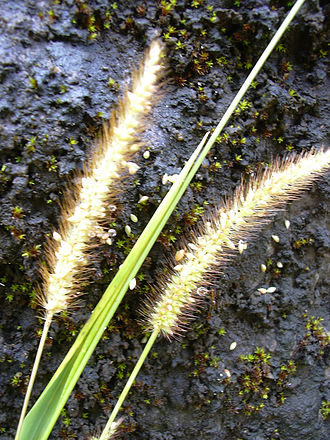Setaria

Setaria is a widespread genus of plants in the grass family.[5][6]
The name is derived from the Latin word seta, meaning “bristle” or “hair”, which refers to the bristly spikelets.[7]
The genus includes over 100 species distributed in many tropical and temperate regions around the world,[8] and members are commonly known as foxtail or bristle grasses.[2][9][10][11][12][13]
Three species of Setaria have been domesticated and used as staple crops throughout history: foxtail millet (S. italica), korali (S. pumila) in India, and, before the full domestication of maize, Setaria macrostachya in Mexico.[14] Several species are still cultivated today as food or as animal fodder, such as foxtail millet (S. italica) and korali (S. pumila), while others are considered invasive weeds.[15] Setaria viridis is currently being developed as a genetic model system for bioenergy grasses.
Numerous species were once considered members of Setaria but have since been reassigned to the following genera: Brachiaria, Dissochondrus, Echinochloa, Holcolemma, Ixophorus, Oplismenus, Panicum, Paspalidium, Pennisetum, Pseudoraphis, Setariopsis, and Urochloa
